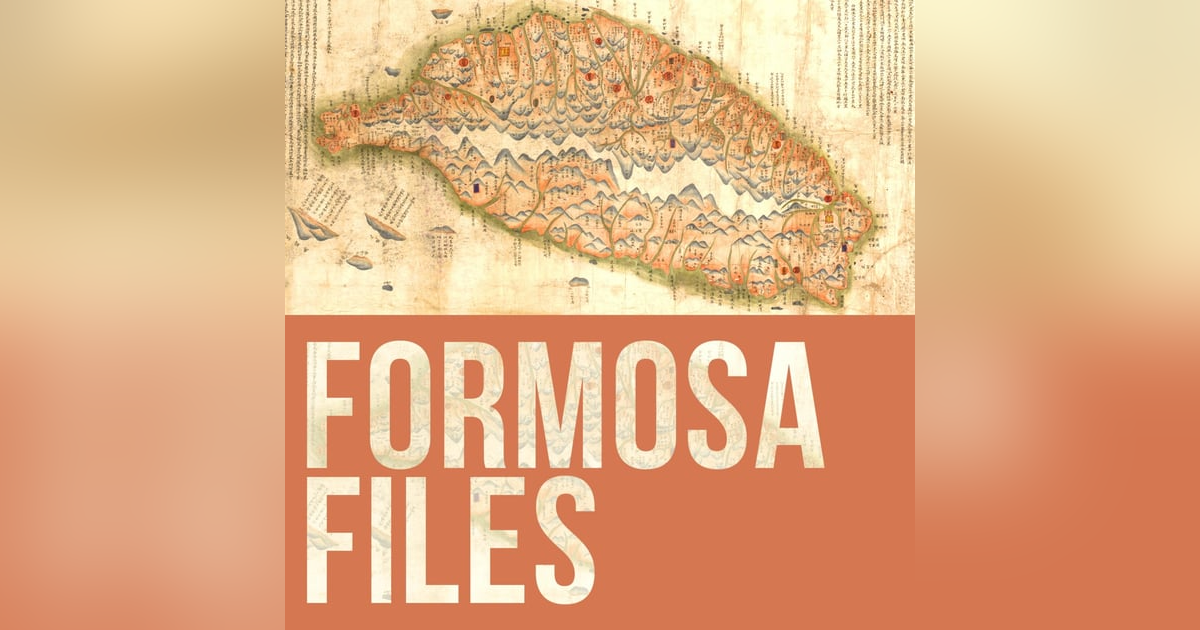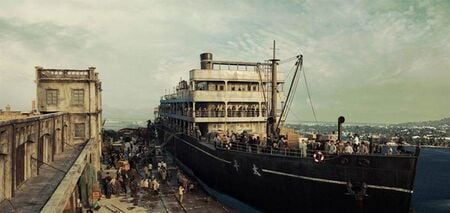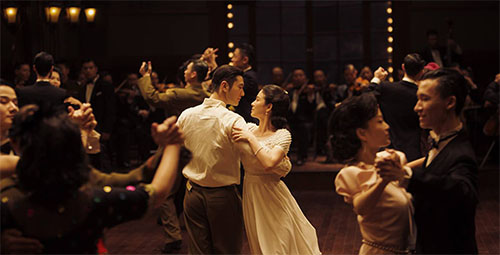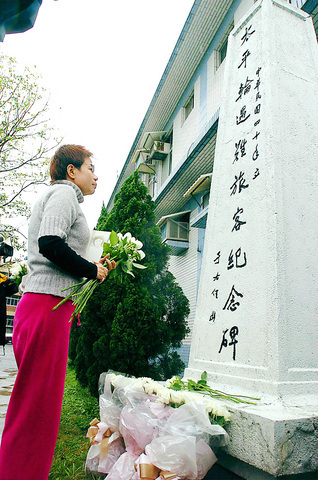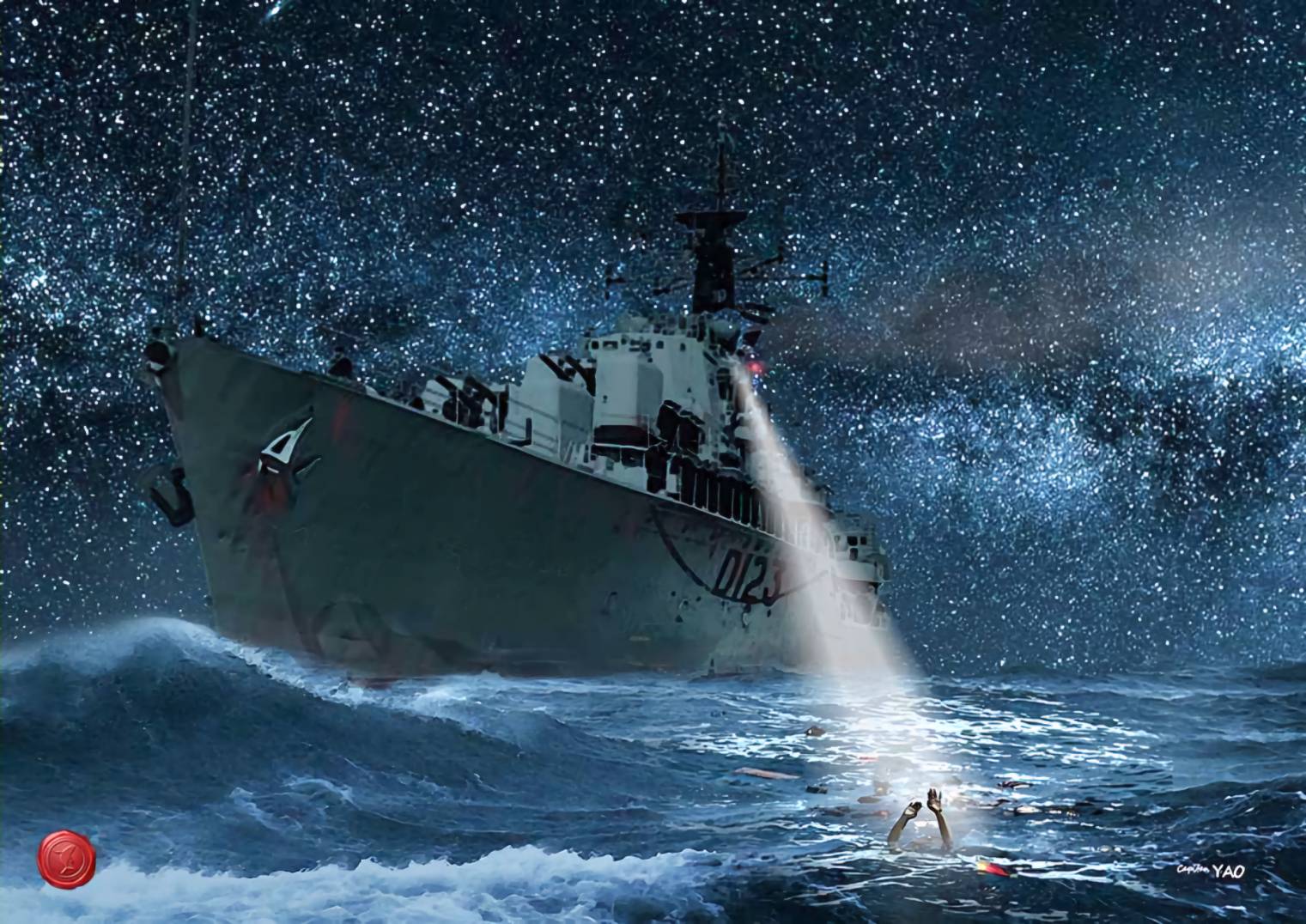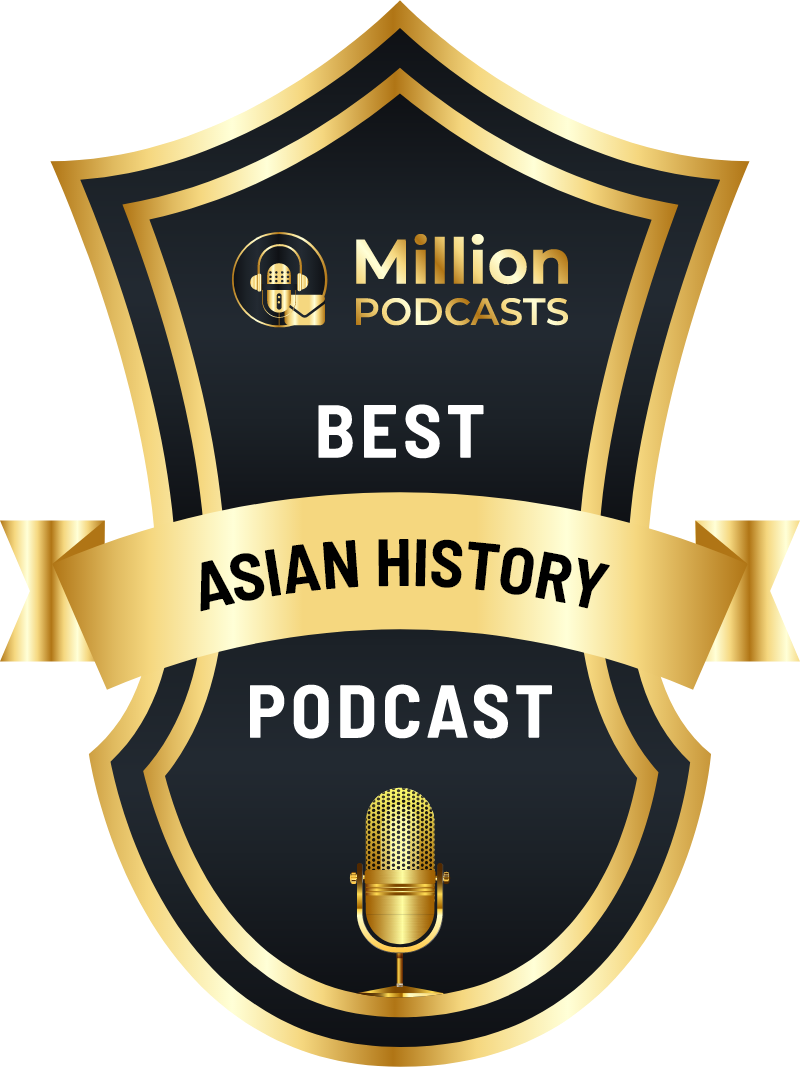S5-E11 - “China’s Titanic” (1949) & The Cruise That Ended in Cremation (1994)


Often called “China’s Titanic,” the 1949 sinking of the Taiping claimed over 1,000 lives as desperate refugees fled Shanghai for Taiwan. Forty-five years later, another tragedy struck: 24 Taiwanese tourists were brutally murdered during a pleasure cruise on China’s Qiandao Lake. The deaths and the clumsy, heartless Chinese cover-up caused outrage in Taiwan. In this episode, Formosa Files is revisiting two haunting shipping disasters that reveal the human cost of war, exile, and political mistrust across the Taiwan Strait.
Cover: A promo image for the 2014 John Woo film "The Crossing - 太平輪"
The five pictures below are all from the 2014 movie "The Crossing."
If you're thinking, "Hey. I don't remember that film," well, you're not alone. This two-part mega project was a bomb at the box office, despite having a cast of some of the most famous actors from Japan, Hong Kong, CHina and Taiwan. It's been described as a bad remake of the film Titanic. Spread out over two parts (the first 128 minutes long, the second 131), the action doesn't really get going until part two, and there a few too many near Titanic rip-offs: a poor soldier falls in love with rich girl who disobeys parents/society for love, a ballroom dancing scene, etc. Those who enjoyed the films point out that there are no epic battle scenes in Titanic, no one is forced into prostitution to survive, and no one shoots a rabbit and then ends up sharing his kill with his communist enemies... so we'll let you judge.
Below: A newspaper from January 28th, "Year of the Republic 38," or 1949, tells of the sinking of the Taiping.
Below: A memorial built in 1951 commemorates those who lost their lives in the Taiping disaster. It's located very near the Cimetière militaire français de Keelung, or Sino-French War Memorial Park. The writing on the pillar is by the late master calligrapher Yu You-ren (于右任).
Below: "The author Chang Tien-wan, whose adoptive mother traveled on the Taiping Steamer, lays down flowers in her mother's memory at a memorial last month for those who died in the tragedy." PHOTO: CHIANG YING-YING, TAIPEI TIMES
Further reading:
Historic sea tragedy revisited - TAIPEI TIMES
Taiping Steamer Memorial Park - 太平輪紀念碑公園
Below: Only around 50 people were rescued by the Royal Australian Navy HMAS Warramunga (artist impression below) and fishermen living on Zhoushan Archipelago.
---------------------------------
Below: The site where a tour boat filled with Taiwanese visiting China was attacked on March 31, 1994. The tourist boat Hai Rui 海瑞號 was touring Qiandao Lake in Chun'an County, Hangzhou, Zhejiang Province when criminals robbed and killed the passengers, and then burned the boat. The victims included 24 Taiwanese tourists and eight Mainland tour guides and crew members, a total of 32 people. There were no survivors on the ship, Qiandao Lake is located in Chun'an County, Zhejiang Province. The lake is an artificial lake formed by the construction of the Xin'anjiang Reservoir in 1958. (Photo by Xu Shangli)
Below via China Times News: "On April 18, 1994, PRC Premier Li Peng made a special speech on the case, saying that the murderers should be severely punished. On May 8, the CCP agreed that, accompanied by the Association for Relations Across the Taiwan Strait and the Public Security Bureau, personnel from Taiwan's Straits Exchange Foundation and legal, forensic technology experts, including criminal expert Hou Youyi (now New Taipei Mayor) could investigate the hull of the Hai Rui. This in turn gave rise to many doubts and disputes. Therefore, even after the CCP announced the details of the case, it is still considered an unsolved case in Taiwan and cannot be verified."
Photos of the burnt boat below via NEWS NOW.
Below: Members of the DPP protest China's handling of the 1994 "Qiandao Island Lake Incident." Interestingly, according to the China Times, a Gallup poll on April 15 of that year, showed the proportion of Taiwanese people supporting Taiwan independence reaching 27%, setting a record high. A United Daily News poll went further, claiming its polling showed that the number of Taiwanese people who "support" and "strongly support" Taiwan independence rose sharply to a combined total of 42%.
Below: The three defendants involved in the Qiandao Lake murder case in court. They were found guilty and on June 12, 1994 and the Hangzhou Intermediate People's Court sentenced the three to death. They didn't waste any time with appeals: the executions were carried out by firing squad on June 19. (Photo by Ye Qingfang)
Via China Times: "On April 15, police arrested Wu Lihong, a 22-year-old found operating a jet ski without a license, and later arrested two others they deemed accomplices, Hu Zhihan and Yu Aijun. elongings of victims were reportedly found in the men's homes, and on April 17, the police announced that they had solved the case. On the same day, the Chinese Communist Party admitted for the first time that the boat burning incident in Qiandao Lake was a planned act of 'murder, robbery, and destruction of evidence.'”
WATCH: Explainer on the Qiandao Lake Incident with video - Chinese
Do us a favor and rate/review the show! It really helps. Do it on Apple Podcasts or here on our website.
Write us with questions or ideas at formosafiles@gmail.com
AND THE BIGGEST REQUEST: tell others about this free, not-for-profit resource about Taiwan.
THE TAIWAN HISTORY PODCAST – FORMOSA FILES
TRANSCRIPT
S5-E11 - “China’s Titanic” (1949) & The Cruise That Ended in Cremation (1994)
Release Date: May 1st, 2025
Time: 27:08
PLEASE NOTE: This transcript was created by AI; it may not be entirely accurate. Any errors are the result of the AI transcription, and Formosa Files is not liable for the content in this transcript. Thank you, and use AI responsibly 😊
As the year 1949 began in China, the country was in economic and political chaos. It hadn't recovered from the long years of war with Japan, 1937 to 1945. And now, the civil war between Chiang Kai-shek's nationalist government and Mao Zedong's communist forces was definitely reaching a final phase.
Cities were falling one by one to the communists. So, for many people, the question was no longer who would win the war, but how do you survive it? And for those with the opportunity, so that would be either location or money, survival meant getting out of China. And Taiwan was the first choice destination.
Ships laden with fearful refugees, more than a million in total, headed across the Taiwan Strait. And some of these ships never made it. One of the most tragic incidents was the sinking of the Taiping, a passenger liner overloaded with refugees fleeing Shanghai for the northern Taiwanese port of Keelung.
Almost all of the estimated 1,500 people on board died, a disaster similar in scale to the sinking of the Titanic. And actually, it's sometimes referred to as China's Titanic.
The Taiwan History Podcast Formosa Files is made possible through the generous sponsorship of the Frank C. Chen Foundation.
It's January 27th, 1949, the day before Chinese New Year's Eve that year, and the mid-sized ocean liner Taiping is in China's greatest city and port, Shanghai. The ship is getting ready to sail for Keelung, the main port in northern Taiwan.
This will be the last voyage from Shanghai before the Chinese New Year. And some of those on board are looking forward to reuniting with family already in Taiwan during this auspicious time of the year. But this will be the last voyage the ship ever makes, and this Lunar New Year will be a horrific time of mourning.
Yes. So, Shanghai to Keelung. This had been a busy route since Japan surrendering the colony of Taiwan in 1945, and it was especially busy now.
The Taiping was one among a large fleet of privately owned steamships that sailed between these two cities. The ship company was the Shanghai-based Central United Shipping Corporation. So to recap, the Chinese Civil War is coming to an end.
The communists are moving south in early 1949. So for the nationalists, this is more of a collapse than an orderly retreat, despite what they probably were saying at the time. Shanghai would fall in May that year.
People wanted out of the city. Ships were packed with refugees heading to Taiwan. And ships were also packed with important cargo heading to Taiwan.
Some of that cargo was precious metals, gold and silver. Also government files, historical artifacts. So they were looting the treasuries, so to speak? Removing them.
A safer place. What are you, a commie or something? Not those wonderful artifacts from the National Palace Museum, right? Originally in Beijing, now in Taipei? Yeah. The National Palace Museum treasures.
No. They were in the capital at the time, Nanjing. And they were shipped to Jilong from there, from Nanjing, early 49 as well.
So yeah. At the same time as our liner, the Taiping. On its last departure, January 27th, the Taiping is sailing with over a thousand passengers.
But we really don't know the exact number. The number we usually see given for passengers and crew is about 1,500. There were 124 crew and officially just 508 passengers.
- At least that is how many tickets had been sold. But many others would have sneaked on board, bribed their way on board.
People were desperate to get out of Shanghai, so they were willing to pay a lot of money. Makes sense. Yeah.
Drawing on the excellent book, The Great Exodus from China, by historian Dominic Meng Xuanyang, the Taiping was not only overloaded with passengers, but also with cargo belonging to the nationalist government, including, quote, a large shipment of silver dollars from the vault of the ROC Central Bank. The old liner also took on heavy machine parts, 600 tons of steel, heaps of official documents, and an assortment of commercial goods for the Chinese New Year, end quote. Wow, 600 tons of steel.
That's not going to help the buoyancy, is it? No. No. So this author says the ship was, quote, so dangerously overfilled that it was forced to cruise at a snail's pace in order to avoid capsizing.
It was a catastrophe in the making. After all the cargo and passengers were aboard, the Taiping finally weighed anchor and set off at 4.17 PM. This is the heart of winter, so dusk is already falling at this point.
About seven hours after departing from Shanghai, so that's a little before midnight, the ship is passing through the Zhoushan Islands, an archipelago off the coast of Zhejiang province. Bang! It collided with a cargo ship, and this smaller cargo ship sank immediately. About 30 survivors from that sinking managed to climb aboard the Taiping, but they would not survive in the end.
The bigger ship is still afloat, but badly damaged. Water is coming in, and the passengers in the lower decks are fighting their way up the ladders as the ship floods. The captain tried to steer the damaged Taiping towards a beach on a nearby island.
Yeah, he was hoping to, like, beach it, but the ship was too heavy, taking in water, and it was just a matter of time before it sank. On the upper deck, quote, panic-stricken passengers, men, women, and children, fought over limited life jackets and lifeboats that would not launch, end quote. Perhaps an hour after the collision, the Taiping was dragged down into the ocean's depths.
Hundreds of survivors were left floating in the water. This is the East China Sea, not an icy cold body of water, not the situation faced by the Titanic survivors, but it's still winter, so... Yes, yes, the water might be something like 10, 12 degrees Celsius. If you're in that kind of temperature, you'll be dead from hypothermia in a couple of hours, I think.
Probably, though. You drown first. Well, yeah, hypothermia, then you drown, yeah.
In the end, only three dozen people, 37, which included a few crew members, survived the sinking of the Taiping. They were rescued by the Waramanga, an Australian naval destroyer which had been en route from Japan to evacuate Australians from Shanghai, and the Chinese Wikipedia page says local fishermen from some nearby islands, quote, rescued some unrecorded survivors, bringing the total number of survivors to just over 50. Just over 50.
That's a shockingly low percentage of survivors. Yep. Before, we mentioned that the sinking is known as the Chinese or the China's Titanic, so I think it's worth comparing some of the numbers to those of the most famous of maritime tragedies, you know, the Titanic.
Always happy to talk about the Titanic. My great-grandmother was on the Carpathia, the first ship to rescue survivors from that tragedy. Anyway, yeah, Titanic, the unsinkable, fastest and biggest ever ship of its time, and on its maiden voyage in 1912.
But yeah, okay, let's look at some numbers comparing the two sinkings. Approximately 1,500 people died in the sinking of the Titanic, so a similar number to the 1,000 to 1,500 for the Taiping. But the Titanic was carrying about 2,200 passengers and crew, of which 710 survived.
So overall, that's a survival rate of about a third. Mm-hmm. But very different depending on gender and class.
Only 20% of the men survived, but that number was 74% for women. We don't have good detailed numbers for the Taiping, but it's just a few percent who survived. There's a Taipei Times article from 2005 on the tragedy, and in 2005, there were a few survivors and immediate family still alive.
So this article from the Taipei Times, it quotes a 92-year-old survivor, surnamed Yang, who recalls how he went out on a small boat to look for his wife's body. Quote, it was stormy and dark. The waves were high.
We saw oil bubbling and bubbling on the sea. We knew it was right here, but we couldn't see anything but the oil, end quote. According to the survivor, he and other bereaved family members continued searching for three days.
Hmm. I'm sure the searching gave them some personal peace, you know, knowing they had tried, but their efforts were in vain. No survivors, not even corpses found, I think.
That same 2005 article recounts the story of another survivor, a Mr. Li. He, his wife, and seven other people were in the sea, clinging to a big wooden box. One after another, the survivors weakened, lost their hold of the box, and slipped under the waves.
Among them, sadly, was Mr. Li's wife. When rescue came about 10 hours later, he was the only one left, sitting on the box, praying. Wow.
That's tough. I mean, those people slipping away into the water and dying gave him that space, that position on the box to sit on it, to have a life. Yeah.
Of course, he probably would have happily exchanged places with his wife if he could, but you don't get to make choices sometimes in situations like this. So a lot of personal tragedies like this, but what were the consequences of the sinking apart from these personal tragedies? Well, it was just part of the chaos of the time. Events rolled on.
Death and disaster are plenty in those dark days. Survivors and bereaved family members mostly tried to forget it, tried to move on with their lives. Yeah.
In peacetime, there would have been a proper investigation, the causes of the accident discovered. Well, we hope there would have been at least, something would have happened at least, remedies would have been thought of. How can we prevent these incidents from happening again? But this is not peacetime.
But still, important people had died, officials, military leaders, rich businessmen, and other elites. And Shanghai had a very vibrant press. So this was big news for a time at least, and newspapers speculated on who or what was to blame.
One article written by a survivor said the ship was overloaded with too much silver and gold, not just overloaded, but unbalanced, so forward heavy. So it lost its balance after the collision with that smaller cargo ship. Another factor commonly cited was that the wartime restriction on lights, so lights had to be out, made the ships almost invisible, invisible until it was too late to turn.
Both ships had been in darkness when they collided. In the book, The Great Exodus from China, the author says, quote, One of the main causes for the disaster was drinking, gambling, and negligence of duty on the part of the crew members, end quote. So okay, they were celebrating the Lunar New Year, yeah? Yeah, it was claimed at the time that most of the crew members were drunk, but it seems a bit harsh blaming people who can't defend themselves.
But regardless of the cause, the shipping company suffered financial loss, huge financial losses. And alongside legal cases, all these claims for compensation lead to bankruptcy. It doesn't help that the Chinese civil war is ongoing and the communists are about to take over.
Right. And confiscate your ship still left in China. Yep.
The owner of the Taiping was Cai (Tsai) Tianduo, who came from a prominent, wealthy family in China. Not so wealthy now, though. Right.
He was a lawyer, a graduate from a notable Shanghai university. So he was able to rebuild a successful life in Taiwan as a lawyer. Many listeners might know his son, if not by the name Kevin Tsai, then by Tsai Kangyong, or perhaps by sight.
He's a popular TV host, a household name here, known for co-hosting a comedy variety show known as Kang Xi Lai Le. That lasted from 2004 to 2016. And he did that with Xiao S, D Xu.
Small S is the younger sister of Da S, Barbie Xu, who passed away suddenly earlier this year. Also, as I understand it, interestingly, Tsai Kangyong was one of the, if not the first person to be very out of the closet gay on Taiwanese television, which was helpful in moving the conversation forward on this. I didn't know that.
Oh, okay. John, what about any other well-known passengers on board who we might know? Well, there were some very well-known people at the time, big names in various fields. But those names won't mean much to us or our listeners.
However, one of the passengers was the father of the forensic scientist, Henry Li. His father died in the sinking of the ship. Yeah, Henry Li, he'd become a leading forensic scientist in the United States.
He worked on that super famous case, OJ Simpson, back in the mid nineties. And then- Never heard of it. Never heard of it.
I kid. I kid. Sorry.
If I did it. Yeah. And then Li came to Taiwan in 04 to investigate the March 19th, 2004 shooting incident of Taiwanese President Chen Shui-bian and Vice President Annette Liu.
That shooting was on the afternoon before the election. And although the shooting was not successful, it came close. Both of them received minor injuries.
It's still a controversial topic in some circles to this day. But Henry Li was pretty clear that, yeah, somebody shot at him. Yes.
And Henry Li was of sufficient status that he helped to dampen some of the controversies, some of the conspiracy theories. Yeah. So this chap, he was a model immigrant in the US, but less than an auspicious start in life.
So he fled China at the end of the Chinese Civil War and in early 1949, he's waiting for his father. In a television documentary, Henry Li recalled the tragedy. So his family is already in Taiwan waiting for dad.
He says, quote, I was too small to understand what I had lost. Yeah, it's sad. He was only 10 years old at the time.
Continuing that quote, he says, the news came on Lunar New Year's Eve. I only knew my mother was very, very sad. Poor woman.
She's lost her husband, the family's source of income, and she's got 13 children. Henry was the 11th of the 13. I didn't know that.
13 children. Oh. So I guess unsurprisingly, the family struggled financially.
Quoting from this documentary, Henry Li says, quote, I think my father's death taught us and forced us to be diligent and frugal. In general, I think the accident is a collective memory shared by all Chinese in Taiwan, Hong Kong and the US and elsewhere. It belongs to those who underwent the national turmoil and whose lives are influenced by it.
And the lack of money for the family was, according to Li, the reason he chose to go to police college. The tuition was free. But police work was something he had a talent for, a great talent for.
Working for the Taipei Police Department, he rose to the rank of captain, okay? Get this, at age 22. The youngest captain in Taiwanese history. Annoying.
Exactly. I resent other people's successes. At 22, wow.
Yeah. Okay. So in 1965, Li and his wife immigrated to the United States and it would be their new home.
There were many other mainlanders who moved from Taiwan onto the US. They went for the opportunities, educational and employment. And wow, in those days, Taiwan was still very poor, America just so much richer.
Yeah. And then wasn't there also, for some people, probably a political element to it where the lack of freedom, they don't see a future in this place. So they're thinking, we just got to go.
But immigrating is not exactly easy. So that option was only open to a tiny minority of mainlanders and decades later, when moving back to China became legal, only a very small number chose to do so. So many of those fleeing from China around 1949, yeah, they wanted to visit their homeland, at least, if not move back.
Their Taiwan-born children, yeah, were keen to have a look too. In the late 1980s, the ban on visiting China was lifted and Taiwanese could visit their big neighbor. That would be late 1987, so nearly four decades after the exodus.
But this new freedom to visit the PRC only applied to those with personal connections to visit relatives and spouses. Yeah, direct flights. Was that only official in 2008? Yes, under Ma Ying-jeou.
So we had the mini links under Chen Shui-bian, the small islands, but yeah, direct flights, 08. Quite recent, really, 2008, but Taiwanese tourism to China actually became a thing in the 1990s. There were several workarounds.
China wanted the money, so they were okay with it. The authorities were not the only ones, however, with money signs in their eyes. The relatives of the Taiwanese visitors also had big boing.
Yes, and there was a fair amount of disillusionment at the greedy nature of some of these reunions. Yeah, think of it, family separated for 40 years, your long lost brother or sister, cousins, you know, and a lot of emotions involved meeting up with them. And expectations, realistic or not, on both sides, the mainlanders had maybe rose-tinted memories of an idyllic China.
Yep, and for the Chinese, Taiwan was a rich country and the expectation was that all visitors were wealthy and would be very generous. Visiting Taiwanese, yeah, were expected to come bearing gifts, that ever practical hongbao, red envelope with cash. Or, hey, you know, maybe a rice cooker, that would be cool too.
And there might be requests for financial assistance, an upcoming wedding, house needs repairing, tuition for grandkids, and so on. Yeah, so you can imagine, in the beginning it's hugs and tears of joy, and then outstretched hands of, we need a new refrigerator. Not the warm glow of family love.
Yeah, but I'm going to not criticize them too much, considering what they'd gone through over those few decades, and the cultural revolution, and all that nastiness. And they would have been punished for having relatives in Taiwan. Oh yeah, good point, wow, so.
Yeah. And also, this whole scenario could extend beyond the circle of family. Local officials, especially in rural areas, might sometimes insert themselves into the visit, asking for donations to village schools, or maybe you would like to sponsor the construction of a sports center, or something.
Yes, so all this expected generosity is, in part, grounded in tradition. It's normal to bring gifts on a family visit, and for overseas Chinese who've been successful, it's normal for them to share in their good fortune when they come back. But, you know, this was a tidal wave of requests, disheartening for the visitors.
Yep, as a result, many early returnees went back to Taiwan feeling upset, and never wanting to visit again. I've mentioned this Ping Dong grandfather of my wife's. He was one of those.
He went back, had a less than pleasant experience, and then just stayed back in Taiwan. In Taiwanese newspapers at the time, there were many cautionary stories, reports about such visits. Yeah, but moving over to 1994, there was a tragedy that was something of a time mark for the souring of Taiwanese getting to know China again.
We started this episode with a shipping disaster, so we're going to turn to another one, but this time involving a tour group from Taiwan visiting China in that year of 1994. It's called the Qiandao Lake Incident. So Qian, a thousand, Dao, island.
It's also known as the Thousand Island Lake Incident, because that's how everything seems to be named in Taiwan and China, the something-something incident. Yes, yes. It's a scenic area a few hundred kilometers southwest of Shanghai, and on March 31st, news comes out that a tour group taking a cruise on Qiandao Lake on a ship called the Haire is missing.
The Haire has disappeared, as have the 24 Taiwanese tourists on it. But it's in Taiwan the next day that there's actually a notification, and it's just that the tour group has not checked into their hotel as per their itinerary. So more news comes the following day.
This cruise vessel on the lake had suffered a fire, an accident. All people on board, 24 Taiwanese tourists, six crew members, and two tour guides were dead, their bodies so badly burned that identification is problematic. In Taiwan, the news is received with anger and incomprehension.
Why were they missing one day and now the next they're all dead? Yeah, and the details are very suspicious. If there's an accidental fire, how come nobody jumped into the water to try to escape? Yes, it's looking like a case of murder. And why didn't they jump into the lake? It turns out that they were locked in the hold, the lower deck of the ship.
Yeah, that wouldn't be discovered until later, right? Because the local authorities insist it's not arson, not robbery, not murder. Just some mouse ate a wire or something. Yeah, accidental fire, electrical problems.
Family members of the victims, two groups totaling 55 people, traveled from Taiwan to Hong Kong and into China to the scene where the bodies were being temporarily kept. They wanted to identify their deceased loved ones. OK, this is where it gets really weird.
Most of the bodies were burned above the waist, but not below the waist. Quoting from a Taiwanese magazine from 1994, quote, Relatives suspected that the victims had been crowded into the hold and then murdered with a flamethrower or doused with gasoline and set afire, end quote. Shocking, I don't know what to say.
Yeah, and then family members also noticed what looked like bullet holes in the tour boat. And the Chinese communist authorities deny all this, but also don't allow any photographs. The authorities treated the Taiwanese relatives in a really callous and unhelpful manner.
Likewise, Taiwan officials were barred from coming to the site to assist the relatives and reporters were kept away. Those who tried had their film confiscated. Another detail was that large amounts of cash carried by the victims was missing.
Luggage was also missing. The relatives wanted the bodies to be transported back to Taiwan for burial, but the communist authorities said no. Right.
So yeah, simple solution, burn the evidence. And overall, it's just turning into a clumsy coverup, yeah? Yeah, it gets worse. When the relatives returned to their hotel at night, they were locked in by the armed police and restricted from leaving the hotel.
Whoa. So the relatives negotiate for two days with the mainland authorities over how to handle the bodies. Finally, exhausted, realizing that the authorities are determined to do what they're going to do, they agree to have the bodies cremated in China.
This happened on April 7th. Yeah, this is outrageous. Outrageous.
And the anger was building in Taiwan at the Chinese, their lies, and especially the mistreatment of grieving Taiwanese family members. Then President Lee Teng-hui publicly criticized the CCP's handling of the incident. Yes, I believe he used that old term for commies.
He called them bandits. There was a tour group boycott of travel to China and also threats of boycotts of investment, trade, other things. There were demonstrations in Taiwan.
And in Canada and the US, Taiwanese Americans protested in front of Chinese embassies. And finally, under all this pressure, the Chinese Communist Party admitted that the March 31 fire on the tour boat had not been an accident. It was indeed a horrific case of robbery, cold-blooded murder, and the fire was an attempt to destroy evidence.
They announced that they had arrested three suspects, all three men in their early 20s. And in June, they were given death sentences. Unfortunately, the Chinese investigation and trial of these suspects did not put the incident to rest.
Many relatives of the deceased and other people in Taiwan suspected that these three men were scapegoats and that there may have been some military involvement in the form of rogue PLA members. Yeah, those were wild days in China. And speaking of wild days in China, let's segue to Plum Rain Press's latest release, a novel set in Shanghai in 2000.
It's called China Running Dog, written by quite a well-known old China hand, Mark Kitto. And this wonderful novel looks at a couple of young British expats in China and them getting involved in dangerous matters. It doesn't, however, feature any gory stories of flamethrowers.
There are cool stories, but... You handled yourself very well when we discussed that earlier, but I knew your dark humor would... It's a great book. It's a great read. Great read.
People can go to PlumRainPress.com and see the details. Okay, we've got our book plug in. We've got a couple of fascinating stories today.
Hope you enjoyed them. Thanks for listening to Formosa Files. I'm Eryk Michael Smith.
I'm John Ross. Bye.
